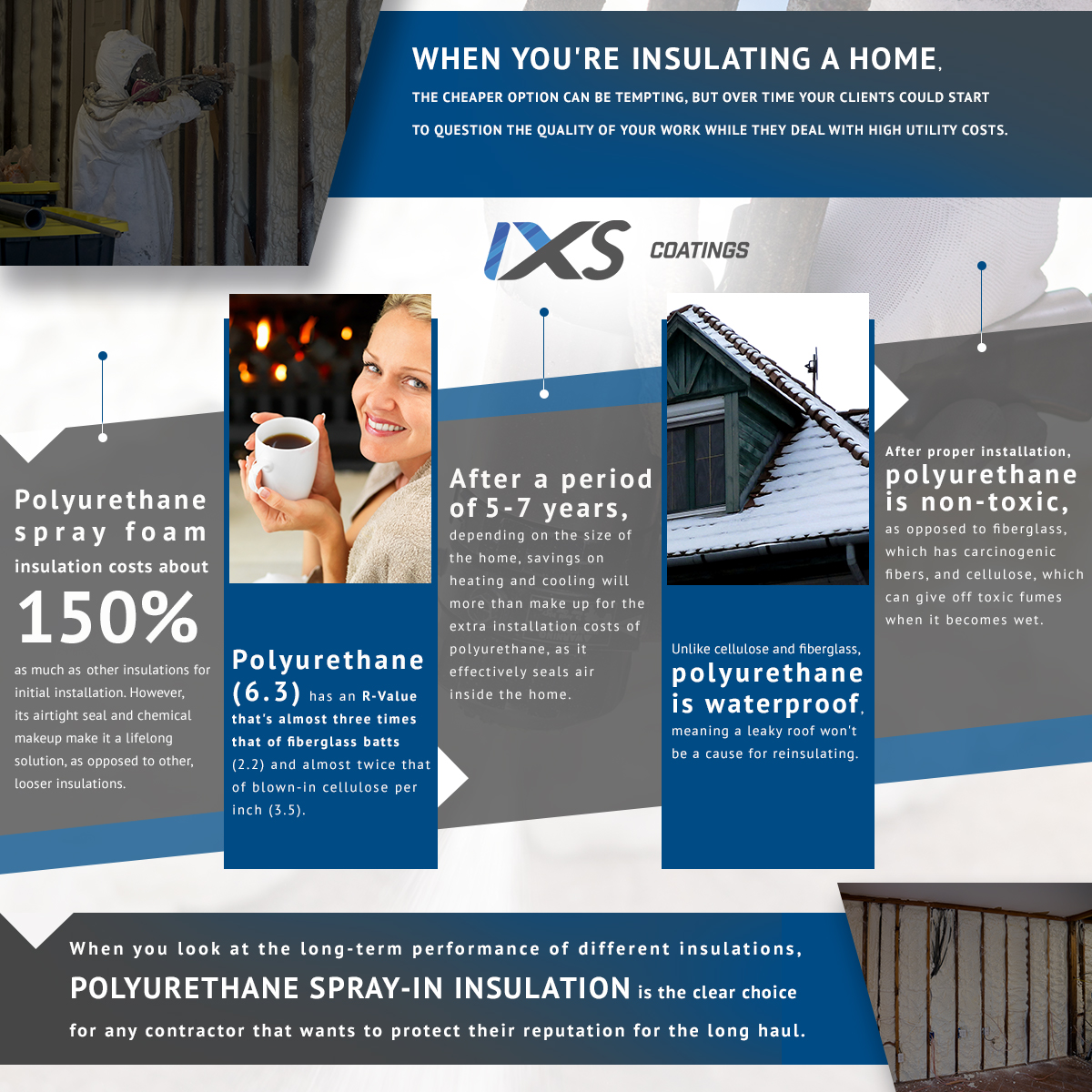Spray Foam Insulation For Construction
One of the many different products that’s offered from IXS Coatings is polyurethane spray foam insulation. Spraying our foam insulation provides the same benefits as many of our other products in that it can be applied quickly and the compactness makes it near impenetrable. Spray-in applications of polyurethane foam are more efficient than fiberglass, plus, with spray applications, you can get into almost any crack or crevice and smooth it over for a clean finish.
There are upsides for everyone when it comes to polyurethane foam, including:
- Quick application
- Being applicable in spaces too small for other insulators
- Supplying increased energy efficiency to homes
- Easily recycled and reused
Common Questions About Polyurethane Foam Insulation
Is Polyurethane Foam Safe For Humans?
Polyurethane foam insulation is arguably as safe as modern insulation. Compared to other insulations, it’s just as safe or safer for those installing it, safe for the building’s future occupants, and friendly to the environment in the long term.
Wearing proper protective equipment at all times is essential when mixing and applying polyurethane spray foam, because of chemicals called isocyanates. These chemicals are harmful to the skin and respiratory system if not properly protected against, but insulation professionals know this and should take the right steps to guard against it.
With proper installation and setting time, polyurethane foam insulation is considered to be safe for the building’s occupants. Polyurethane sanding or drilling, or any other modifications, should be left to professionals or those with protective equipment because those processes could release the harmful isocyanate particles back into the air.
Is Polyurethane Foam Safe For The Environment?
In terms of the environment, polyurethane foam is made from oil, but also greatly reduces the need for fossil fuel consumption once it is applied to buildings, cars, and various appliances. With polyurethane foam insulation being so compact, the amount of air that can pass through it is close to zero. With about 45% of fossil fuel consumption coming from heating and cooling applications, polyurethane spray foam insulation can greatly reduce our fossil fuel consumption over time.
Polyurethane foam is also recyclable through the proper channels and can be used to generate energy after removal. Essentially, polyurethane foam is one of the most efficient uses of fossil fuels and a tool to help lower our carbon footprint.
How Does Polyurethane Foam Compare to Fiberglass?
Fiberglass and polyurethane foam are most comparable in that they both act as insulators. Aside from the fact that they can both be harmful to the installer without the proper protective equipment, there’s really not much that ties the two. They are made out of different materials, they have different repercussions for the environment, and they have different levels of efficiency.
- How they’re made — Polyurethane applications are made from diisocyanates, a chemical derived from oil. When they are mixed with a variety of other chemicals, depending on the polyurethane’s intended use, the diisocyanates undergo a process that makes them safe for humans to use. Polyurethane is found in such a variety of forms, that most people will use a product featuring polyurethane every day. Fiberglass insulation is made of glass wool fibers, which are formed from glass, which is made from sand.
- Their environmental effects — Fiberglass and polyurethane both use finite resources for their composition, and both are recyclable through the right channels. What makes polyurethane better for the environment is that it saves more energy than fiberglass. On average, fiberglass insulation allows more than 30% of heat or air conditioning to escape, whereas polyurethane is airtight when properly applied.
- Their efficiency levels — When it comes to efficiency, there’s not much of a comparison. As previously stated, polyurethane spray foam insulation has an R-value that’s almost three times as high as that of fiberglass. So it serves much more benefit to the owners of the building in terms of energy costs. While polyurethane is more expensive to install, that fact is negligible, because in five to seven years, the extra cost is covered by energy savings and from there the homeowner can save for a lifetime. Polyurethane foam installations should be an easy choice for homeowners and construction companies that value the long term quality of their finished build.

What Are Some of the Other Uses of Polyurethane?
We understand that any type of chemical can be intimidating to use when you’re unfamiliar with it. While almost everything has its drawbacks, it’s basically undisputed as to whether polyurethane products are safe. After the proper chemical processes and installation have been performed, homeowners and construction companies alike should have little concerns about the safety of their spray foam insulation.


As stated previously, it’s rare to go your entire day without encountering polyurethane. Even if you exclude the many buildings that have polyurethane foam insulation, you’ll likely be in a vehicle, sit on chair, or open a fridge that uses polyurethane. Here are a few of the everyday products that polyurethane is used in and what purpose they serve:
- Pillows — Used in memory foam pillows to provide moldability
- Coolers — Used to insulate the cooler
- Automobiles — Used to insulate the car, add protection to the passenger cabin, and polyurethane insulation adds fuel efficiency because of its light weight compared to alternatives
- Caulking — Similar to polyurethane foam insulation, polyurethane gives caulking it’s airtight quality
- Furniture — Polyurethane helps add a cushioning quality to furniture and provides for protective coatings that extend the life of leather and other materials
- Clothing — Polyurethane is used in a large amount of clothing, especially in clothing that is made with spandex or leather. It also adds flexibility and protection against the weather
With such an established reputation and presence in your everyday life, there’s really very little concern to be had about the safety of polyurethane products.
Make The Right Insulation Choice For Your Company
If you’re a contractor who is debating about what type of insulation to use in your builds, then make the right choice for you and your customers. With polyurethane foam installations from IXS Coatings, you’ll know that you’re building an energy-efficient home that will save the homeowner money in the long run and add to your reputation as a company that does quality work.



